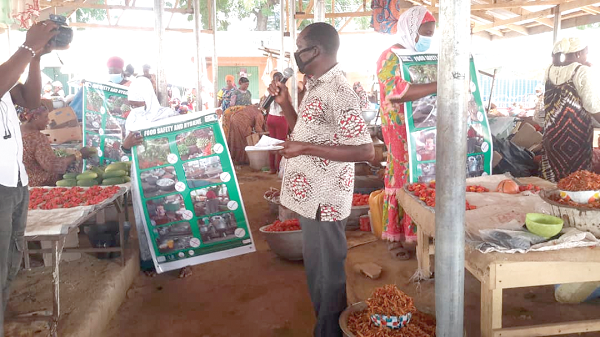
Campaign on effective handling of food items held in Wa
As part of efforts to promote food safety and improved hygiene practices among traders and consumers in the three regions of the north, officials of Market Oriented Agriculture Programme North West (MOAP NW ), a project by the German Development Agency (GIZ), have undertaken a sensitisation campaign on effective handling, storage and display of food products in the markets.
The programme was held in 14 selected markets in the Upper West, Savannah and North-East regions to ensure food items sold to consumers at the market were free of diseases.
The MOAP NW project is being funded by the European Union (EU) and the German Federal Ministry of Economic Cooperation and Development.
The project is a component of the European Union Ghana Agriculture Programme ( EUGAP), which has since 2017, embarked on sensitisation programmes to build the capacity and technical capacity of stakeholders in agriculture towards the growth of agribusiness in the three regions of the north.
The sensitisation campaign was jointly organised with the Regional Department of Women in Agricultural Development (WIAD) and the Environmental Health and Food and Drugs Authority (FDA).
Visit to markets in UW/R
In the Upper West Region, the Technical Advisor of MOAP NW, Dr Zakaria Issahaku, who toured markets in all 11 districts in the area, said food safety and hygiene were crucial to the everyday life of the people since it protected them against food borne illnesses, including food poisoning.
"It was against this backdrop that the campaign was organised in the various markets. And beyond the production of quality food at the farm level, we are also interested in how the food is treated in market places" he said.
Dr Issahaku also said it was observed that food items in traditional markets over the years had not been hygienically handled, thus posing a threat to consumers.
Advice
The Regional Officer of WIAD, Ms Jangu Barikusu Alhassan, advised farmers and market women against the misuse of agro-chemicals on their farms because of its hazardous effect on food items.
Ms Alhassan said if it became necessary, farmers could consult agricultural extension agents ( AEAs ) on how best to use the chemicals.
According to her, the practice of recycling plastic bottles for the sale of iced kenkey, ice cream and palm oil was not healthy since the bottles were not sterilised.
An environmental health analyst, Mr Francis Yelyen, also urged vendors to ensure that food items were sold under hygienic conditions, especially those that were eaten in their raw state.
A trader in the Wa Market, Madam Adle Hikimat, expressed gratitude to the organisers and reminded her colleagues of the need to extend the message to family and friends.
